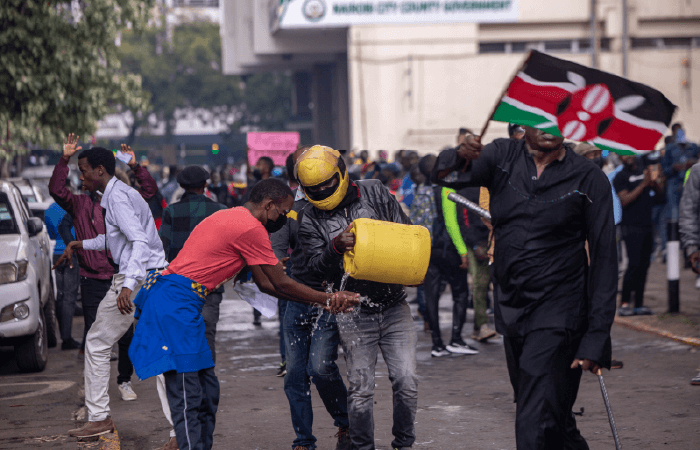As I write this, protesters in Nairobi are being tear gassed and arrested by police for demanding that the much-loathed Finance Bill 2023 be shelved as it will bring unbearable misery to millions of Kenyans and sink hundreds of thousands into poverty. Contrary to his pre-election promises to bring the cost of living down, President William Ruto and his deputy have issued threats against MPs who may vote against a Bill that will introduce new taxes and raise others. They have warned MPs that their constituencies will not receive services and infrastructure like roads if they go against the Bill.
The man who said Kenyan “hustlers” and the poor will benefit most from his presidency has reneged on virtually every election promise he has made. Kenyans who thought life would get better under Ruto are now wondering if they were duped into voting for a man whose leadership style is looking increasingly like his mentor Daniel arap Moi’s.
In the first nine months of his presidency, William Ruto has had to deal with various challenges that reveal a system that is rotten to the core, and which seems to be getting worse. Corruption, it seems, has permeated every sector and every state institution, even those tasked with helping the poor and disadvantaged. Officials are literally stealing from the mouths of babes. Here are just two headlines that appeared in a local daily just in the last month.
16 May 2023 – “Mosquito nets deal bites PS, Kemsa bosses” This story talked about how the Kenya Medical Supplies Authority botched up a tender worth Sh3.7 billion for the supply of treated mosquito nets. This prompted the donor organisation, the Global Fund, to demand action against officials implicated in the tendering process. This scandal came in the wake of the “covid millionaires” scandal in 2020 that saw KEMSA officials give tenders to fake suppliers of PPEs at highly inflated rates. That particular scam happened in the middle of a pandemic, when millions of people around the world were dying from Covid-19. Imagine the heartlessness of those who thought they could become millionaires on the backs of people who could die of a disease because of inadequate medical supplies.
19 May 2023 – “Rogue quartet in toxic sugar scam” This story revealed how condemned sugar that was deemed poisonous vanished from a warehouse under the watch of the Kenya Bureau of Standards. Two MPs and two top government officials are said to have orchestrated the release of the sugar to the market in what appeared to be a well-coordinated operation that sought to enrich a few well-connected individuals. None of these individuals cared if thousands of Kenyans died or became sick as a result of eating the toxic sugar.
As these scandals were playing out in the media, more than 200 bodies had been exhumed from Shakahola in Kilifi where a pastor named Paul Mackenzie had lured devotees to starve themselves to death so they could enter heaven.
There is something terribly wrong with this country. I believe we have abdicated the social contract and humanity that bound traditional African countries together – the ubuntu that made us each others’ keepers. Ubuntu is a philosophy based on the principle “I am what I am because of who we all are.” Traditional African societies ensured that no one in a village starved because people shared food in times of scarcity. It took a village to raise a child, and no child was an orphan.
This is the type of social contract that John Locke, Jean-Jacques Rousseau and Thomas Hobbes philosophised about when they talked about the public good being greater than the needs of an individual. This social contract stops societies from descending into anarchy. It dictates that when a pregnant woman gets on a bus, she is offered a seat. When a person passes out on a street, passersby will stop and help him regain consciousness rather than let him just lie there. It is when people witnessing a car accident call an ambulance rather than wait for the accident victim to die so they can steal his wallet, phone and whatever else they think is valuable from the car, as so often happens in Kenya. It is when a leader resigns after he is implicated in some kind of wrongdoing because it is the ethical thing to do, especially when the wrongdoing involves taxpayers’ money. It is being able to see the larger picture of everyone being safe because we are all looking out for each other.
When did Kenyans descend into becoming selfish, short-sighted people who cannot see beyond their noses, who let millions die so a few can become millionaires and who lie at every opportunity because honesty is not rewarded in this country? I honestly don’t know. What I do know is that because our leaders have been so unethical and corrupt, every Kenyan feels he or she has the licence to steal. Fish rots from the head.
Don’t get me wrong. There are still some incredibly good, kind and compassionate people in this country. But they are rarely recognised for the good deeds they do. Instead, they are labelled weak and unambitious.
For the social contract between Kenyans to be restored, we must seek alternative leadership that understands that when the social contract in a society is broken, that society breaks down. And we as a nation must heal. But healing requires work. It requires confronting uncomfortable truths about ourselves and our past.
Maybe that is what the protests against the Finance Bill are all about. They are about restoring the social contract that began eroding at Kenya’s independence in 1963 when some leaders decided that governing meant enriching themselves and their families at the cost of wananchi.

